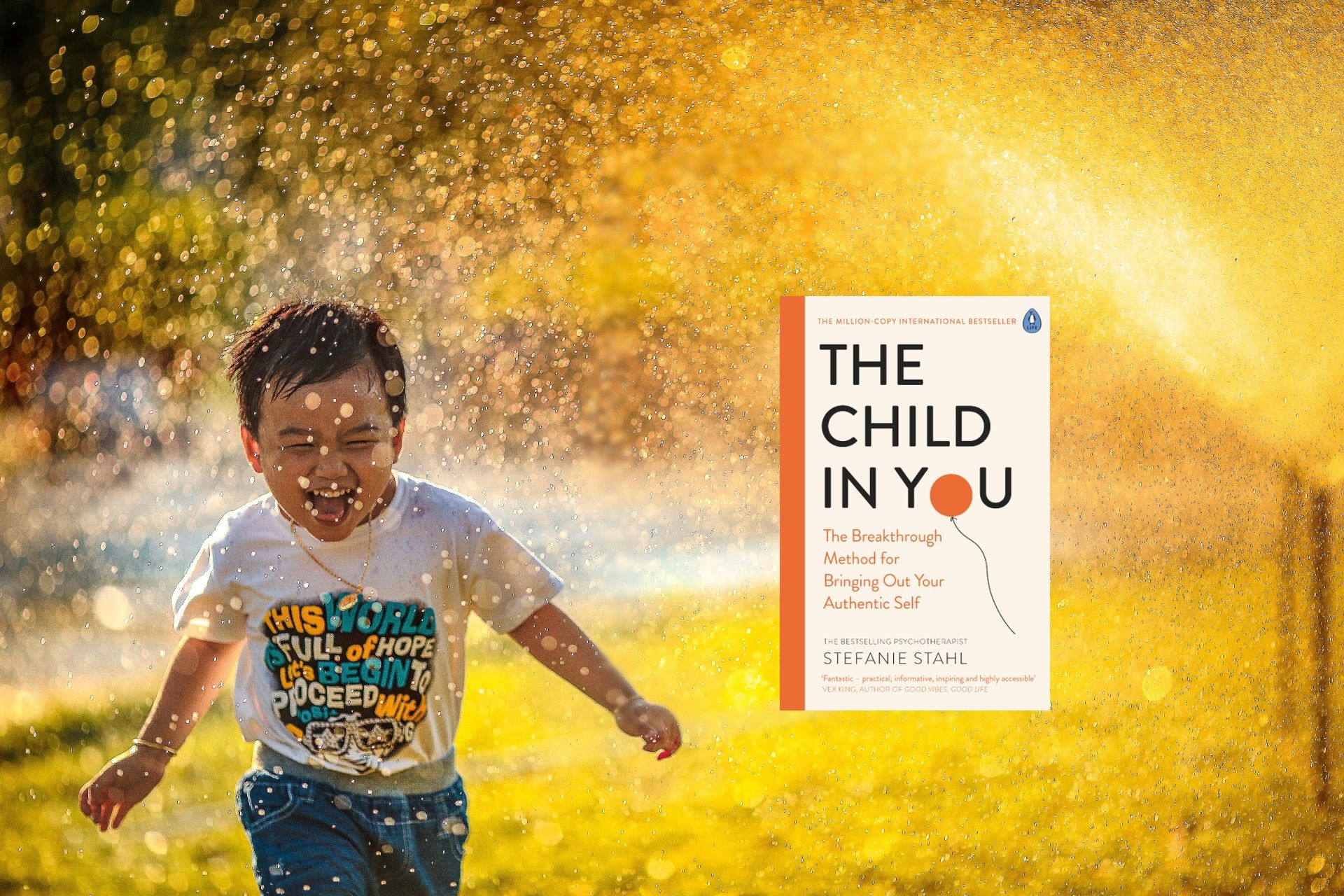The Child in You - Book Summary

by Stefanie Stahl
"I thoroughly recommend The Child In You, which will help anyone who wants to improve their mental wellbeing. We should all know our inner child, and Stefanie Stahl shows how we can get to do so, exploring this concept with warmth and accessibility"
– Julia Samuel, author of Grief Works and This Too Shall Pass
Everyone needs a space where they can feel protected, secure, and welcome.
In adulthood, our negative experiences from the past are creating a lot of difficulties. Our inner child is trying to protect us from those painful moments and also is asking for what was missing.
The book divides us into 3 parts:
- The Shadow Child - is developed from our childhood negative beliefs and experiences (fear, grief, helplessness or anger); This activates a defence mechanism that can be: withdrawal, keeping the peace, perfectionism, aggression and attack, or vying for power or control;
- The Sun Child - contains all the good and positive experiences;
- Our adult self - our present adult form;
The four basic psychological needs:
- Need for Connection - this can be ignored by the parents with negligence, rejection or/and abuse. Growing up, the child will avoid tight relationships or will become very dependent on their partner and /or other people.
- Need for Autonomy and Security - if the parents were extremely protective, giving too many directives and limiting the child's freedom( suppressing their feelings like anger, curiosity...- the child will believe is something wrong with them) and growing up, he will exert a high need for power and control because this will bring him a safe feeling or he will continue to stay limited, doubting his capabilities;
- Need for Pleasure - If the child didn't receive rewards and enough of the activities that bring him pleasure, he will reach adulthood and will continue to stay in an unhappy state by auto sabotaging his life;
- also, if the child receives too much pleasure, by being spoiled, he will end up having a hard time restraining his cravings, he will take much time to adapt in life, and learn that he must make the effort in getting what he wants. - Need for Self-esteem and Recognition - if the parents didn't make the child wanted and valued, growing up he will have low self-esteem.
The Shadow Child will develop some Self-Protection strategies:
- Repressing Reality - the belief is that if this is ignored, then I don't feel it and I don't have to deal with it;
- Projection and Victimization - in here I will see others how I need to see them (for example if I am weak I will see others dominant or I will project in my partner my experiences that I had with my parents), or if there was a good and healthy childhood the issue is that you can believe/expect everyone is as kind and correct as your parents;
- Perfectionism, Obsession with Beauty, and Yearning for Recognition - most people don't know their value so they live a defensive life, they will never be happy with what they have, and no matter what they do, their inner child will never be fully impressed. Some will take physical action(botox, esthetics etc) and some will also try to impress everyone with their friends or partners because he is in a "good elite".
First aid: You have decided to protect your shadow child by not giving anyone reason to criticize you. This strategy has helped you succeed in life, but you’re in danger of running yourself into the ground. Besides, this strategy will not grant you access to your shadow child. With the help of your inner adult, come to realize that the whole success-and-recognition thing primarily plays out in your mind. You might even be nicer if you loosened up a little. Also remember that your shadow child will always demand a “stronger hit,” so in the long run, you won’t find your peace with this strategy. - Keeping the Peace and Overadjustment - the drive to keep the peace and make everyone happy is a very common self-protection strategy. They’re often simultaneously at play. Both strategies protect the shadow child’s extreme fear of rejection.
First aid: Your shadow child wants to remain as hidden as possible, making it hard for others to tell where they stand with you. Let your shadow child know that it’s welcome to show its face every now and then. It’s allowed to stand by its desires and needs. You won’t lose appeal in doing this—you might even earn points, as you become more emotionally available and transparent to your contemporaries. - Helper Syndrome - they feel valued and needed when they help others, this is not an issue but it is because when it's done for the wrong reasons. The problem is that helpers tend to attach themselves to people they can’t help. They can get caught in hopeless projects, especially when the “person in need” is their partner.
First aid: try to stop getting exhausted in projects with no end. Tell your shadow child, that he is good enough even if he doesn't jump to help someone. - The Control Freaks and Resistance- people who crave control focus not only on optimizing themselves but will also keep a close eye on their partner and other family members. Control freaks demand to be kept informed of their loved ones’ activities because they trust other people as little as they trust themselves.
(Low libido is a way to show a passive-aggressive - for both men and women.)
First aid: Your need for control often stresses you out, as it does those around you. It is especially important for you that your shadow child gain self-confidence. Try to relax and let go, the conflicts that are made from gaining power are not worth it. - Aggression and Attack - the problem is that impulsive anger is very hard to tame. If someone wants to rein in their impulsiveness, the interventions must target the rage and its prevention. They are very strong and know how to protect themself. They're a fighter.
First aid: Your shadow child is easily offended. Try to stay with your adult self, thus remaining at eye level with your contemporaries and allowing you to respond in a rational, appropriate way. It can help a lot to prepare yourself for situations that could set you off. Analyze the role your shadow child—with its skewed perception—plays in this, and separate it from your inner adult. Your inner adult must keep the upper hand at all costs. - Affective Regression - some people do not want to grow, when they were small their parents control them, ex: saying that they will be removed from the family if they do not do how they wish. This creates a regression on the child and as adults, they hold on to other people in the hope they will "rise" them. Sometimes even they do not know what they want, leaving the others to make decisions.
They do not need to have a good relationship with their parents to have this mechanism.
First-aid: Your inner child has a high fear of not letting anyone down, and they don't want to make mistakes. With your adult self try to assure that is human to make mistakes, and that he can. You are responsible for your happiness and you didn't come into this world to live by others' decisions. - Flight, Withdrawal, and Avoidance - diving into activities serves the purpose of distracting us from our main problem. We might not even be aware of what we’re doing, since these distractions suppress the underlying hardships the shadow child is suffering.
First aid: Although withdrawal is a very useful self-protection strategy, it can also mean you’re often running away from “ghosts.” But you really don’t need to hide. - Narcissism - people with a narcissistic personality learned early in life to suppress their shadow child, which felt worthless and miserable, by adopting an ideal second self. They cannot stand weakness in themselves, nor can they tolerate it in others. Narcissists do whatever it takes to elevate themselves above the average, to create this ideal self. They also like to praise with their great spouse, friends and objects.
First aid: Your self-protection strategy requires a lot of energy and constantly leads to stressful situations with the people around you. Be aware of the fact that all your efforts to be something special won’t heal your shadow child. You can only heal your shadow child once you fully accept it. Stop fighting your supposed weaknesses and accept that you are simply human, like everyone else. Only then will you be able to relax—for maybe the first time in your life.
The book offers some exercises on how to discover your Shadow child and how to heal him.
Reparenting Yourself and Give your Shadow child Love and Understanding.

Note: Some pieces of information are left out of the book.
Get the full experience by reading it! ❤
